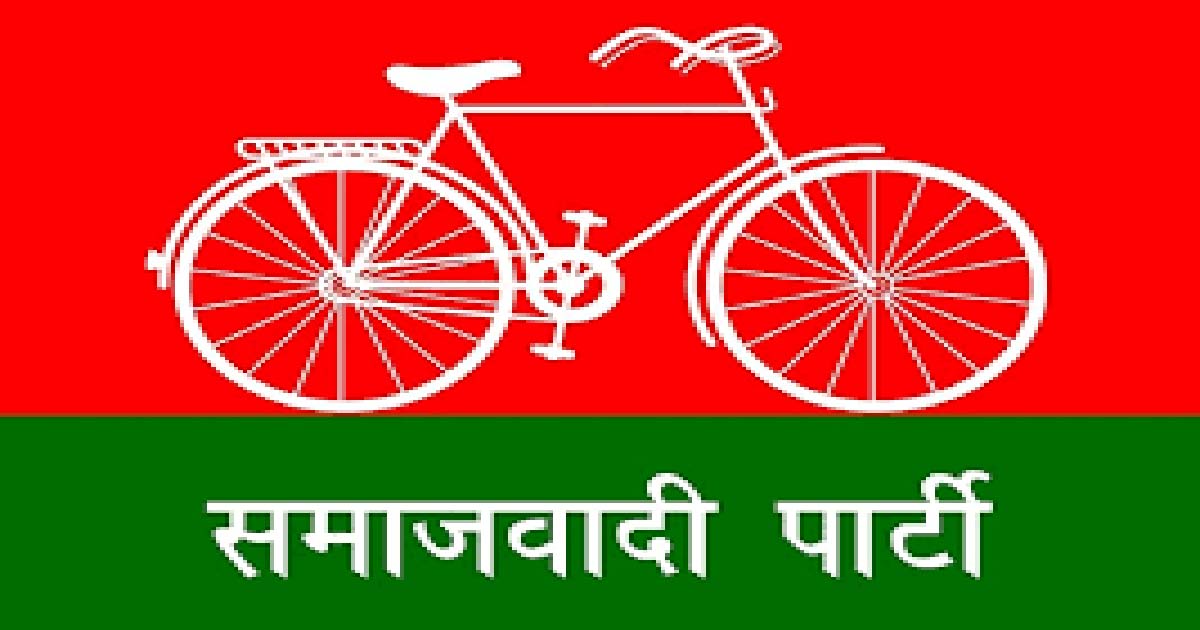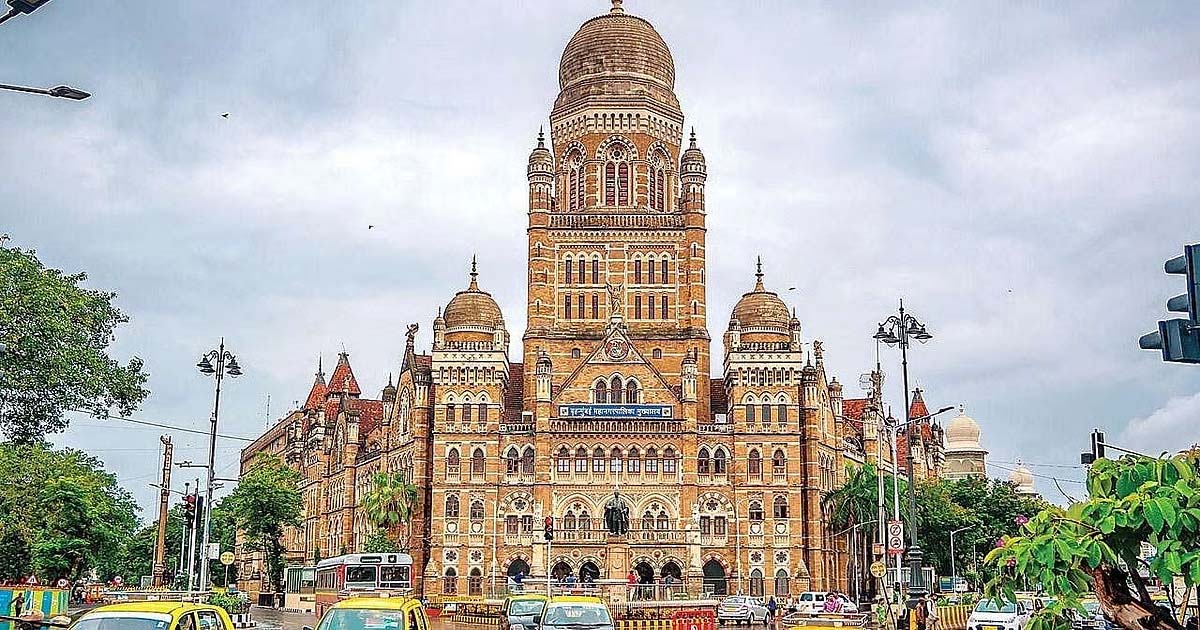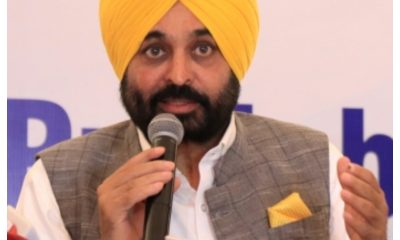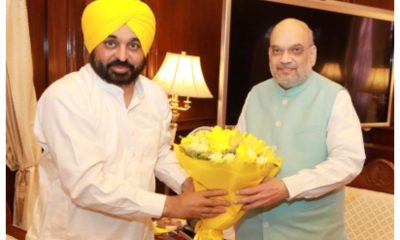General
Punjab farmers end protest on Chandigarh borders; consensus on demands

The stalemate between protesting farmers and the Punjab government led by Bhagwant Mann ended on Wednesday with a consensus on most of their demands, comprising beginning paddy sowing from June 10.
They later called off their protest that began a day earlier on borders of the state capital Chandigarh, similar on the lines of the year-long protest against the Centre’s farm laws at the Delhi borders that ended with the revoking of the three Central farm laws.
The meeting between the Chief Minister and leaders of 23 farmers’ unions under the banner of the Sanyukt Kisan Morcha that lasted for over two and half hours here.
After the meeting, Rural Development and Panchayats Minister Kuldip Singh Dhaliwal reached the protest venue in Mohali, near here, where thousands of farmers had been staging a sit-in protest since Tuesday.
He said the meeting of the farmers with the Chief Minister was fruitful and the farmers accepted to end the protest. There was a consensus on 12 out of 13 demands of farmers.
The prominent demands include minimum support price (MSP) for the purchase of maize, basmati and moong (pulses) that the government has assured, ending staggered paddy cultivation from June 18, electricity prepaid meters not to be installed, besides a compensation of Rs 500 per quintal for those who suffered losses due to early onset of early summer.
The farmers on Wednesday threatened to break the barricades set up on borders to march to the Chief Minister’s residence in Chandigarh if their demands were not met.
After the meeting, farmer leader Jagjit Singh Dallewal told the media that the Chief Minister has accepted their demand to divide the state into two zones for sowing of paddy instead of four.
“Now half of the state would be able to sow paddy from June 14, while the rest from June 17. We have been asked to divide the districts into two zones. Earlier, the government had ordered that the sowing would start from June 18 in a staggered manner in the four zones,” he said.
The government assured the farmers that they would get MSP on moong (lentils) and a notification in this regard has already been issued.
At the meeting, the Chief Minister asked the farmers to immediately go for paddy nursery so that paddy transplantation could be ensured within the stipulated time schedule.
He apprised the farm leaders the government has already issued a notification to procure the entire crop of ‘moong’ on MSP of Rs 7,275 per quintal.
He also assured them that the government is already in the mode of finalizing modalities to procure maize too on MSP to give boost to its ambitious programe of crop diversification.
On the issue of MSP for basmati, the Chief Minister said he would call on Union Home Minister Amit Shah on Thursday to impress upon the government of India to immediately announce MSP on basmati so as to encourage the farmers to go for its cultivation in a big way by shifting from water guzzling paddy.
He also told the farmers that he would also take up the contentious issue of the Bhakra Beas Management Board (BBMB) with Shah for expeditious resolution to the satisfaction of all stakeholders.
Mann urged the union leaders to give him some time for at least one year to bring farmer-friendly reforms in the agriculture sector.
At the same time, he urged them to shun the path of agitation and if they had any grouse against the government they should sit across the table to finally find an amicable solution.
Responding to another issue raised by the farm unions, Mann said the government would soon come out with a comprehensive policy for bestowing ownership rights on the cultivators who had been in possession of panchayat land and cultivating the same since long to convert the barren land into cultivable.
In a related development, the Cabinet led by the Chief Minister approved Rs 1,500 per acre incentive to the farmers for sowing of paddy through the Direct Seeding of Rice (DSR) technology.
A sum of Rs 450 crore has been earmarked to provide incentive to the farmers for promotion of less water consuming and cost effective DSR technology.
This step would be instrumental to save nearly about 15-20 per cent water as compared to the conventional puddling method during the lifecycle of crops.
The alarming situation arisen out of fast depleting groundwater mainly due to water guzzling traditional method of paddy transplantation needs bold measures to check this serious trend instantly.
At present, the water table is falling at rate of 86 cm per year, leading to a precarious situation, where no underground water will be available across the state in coming 15-20 years.
According to a spokesperson for the Chief Minister’s Office, this technique will encourage majority of farmers to adopt as it needs far less water for irrigation, improves percolation, reduces dependence on farm labour and improves soil health and help enhancing yield of both paddy and wheat by 5-10 per cent.
The tempers of the protesting farmers had ran high a day earlier as the Chief Minister failed to meet the leaders over their demands and left for Delhi.
Late in the evening, Mann said the agitation was “unwarranted and undesirable” and asked the farm unions to join hands with the government for checking the depleting water table.
Maharashtra
Mumbai BMC Elections Samajwadi Party’s first list released but no decision on ward number 211

Mumbai: In the Mumbai municipal elections, Mahayoti and Maha Vikas Aghadi have not yet reached an electoral agreement, while the Congress Party, Samajwadi Party and AIMIM have released their first list of candidates for the municipal corporation. The Samajwadi Party has released the first list of 21 candidates, in which Zeb-un-Nisa Malik has been appointed as the candidate from 213, along with Shahzad Abrahani from 212. There is a tug of war going on in the Samajwadi Party over ward number 211, so the party has not announced its candidate for this ward. SP leader Raees Sheikh has also introduced his brother Salim Sheikh as a candidate for this ward. The Samajwadi Party has not yet taken any decision regarding the ticket in this ward, while the candidature of Raees Sheikh’s brother is also being opposed. Local women have opened a front against Raees Sheikh and have also submitted a claim for the SP candidacy. In such a situation, who will be given a candidate from 211 in the Samajwadi Party is still pending. Samajwadi Party had announced to separate from Maha Vikas Aghadi and contest the elections alone, while Uddhav and Raj Thackeray have also reached an electoral understanding. Along with this, Ajit Pawar and Sharad Pawar’s NCP is also in talks regarding an electoral understanding. If there is an electoral understanding between Ajit Pawar and Sharad Pawar, then the Congress party is ready to contest the elections alone, this has been claimed by Congress leader Jaya Witward. In the Mumbai BMC elections, every political party is trying to outdo each other, while the two brothers have formed an alliance on the issue of Marathi Manas and banners of Marathi Manas being united are also being displayed in Mumbai city.
Maharashtra
Mumbai Municipal Corporation general elections: Attendance at election training mandatory for officers and employees, criminal action will be taken against absenteeism

Mumbai: Municipal Corporation All officers and employees involved in the election process will be provided with necessary training to conduct the general elections in a transparent, fair and smooth manner. Training sessions have been organized from Monday 29th December 2025 to Monday 5th January 2026. The date, time and venue of the training have been intimated separately to all the concerned officers and employees. It is mandatory for the officers and employees to attend this training. The Municipal Corporation Administration has issued a strict warning that as per the instructions of the Hon’ble State Election Commission Maharashtra, criminal action will be taken against the officers and employees who are absent from the training or do not follow the orders. The State Election Commission, Maharashtra has announced the election schedule for the Municipal Corporation General Elections 2025-26. The voting process for the Municipal Corporation General Elections will be on Thursday 15th January 2026 from 7.30 am to 5.30 pm. Also, the counting process and results will be declared on Friday 16th January 2026 from 10 am.
All the stages related to the election process have been strictly planned to conduct the Municipal Corporation General Elections in a completely transparent, fair and smooth manner. Since it is necessary to provide necessary training to the Polling Station President (PRO), Assistant Polling Station President (APRO), Polling Officer (PO) and the employees involved in this election process, special training sessions have been organized by the Municipal Administration. This training session has been organized from Monday, December 29, 2025 to Monday, January 5, 2026. Training will be implemented in various stages during this period. The training will provide detailed guidance on the responsibilities of the election process, code of conduct, voting and counting process, legal matters and steps to be taken in emergency situations. The main objective of the election training is to make the election process credible and transparent by avoiding any kind of error, ambiguity or malpractice.
The date, time and venue of the training have been communicated to all the concerned officers and employees through separate appointment orders. It is mandatory for all officers and employees to attend this training. Absence will not be accepted for any reason. As per the directions of the State Election Commission, the Municipal Corporation Administration is giving a strict warning that officers and employees who are absent from the training session, do not comply with the orders or fail to perform their duties in the election process, will be subject to disciplinary action including criminal proceedings under Section 28 (a) of the Mumbai Municipal Corporation Act, 1888. Please take this matter very seriously and attend the training and discharge your duties honestly.
Crime
मुंबई के पायधोनी में करोड़ों रुपये के ड्रग्स के साथ 9 आरोपी गिरफ्तार, इनमें 3 महिला तस्कर भी शामिल

मुंबई : ड्रग्स के खिलाफ एक बड़े ऑपरेशन में, पायधोनी पुलिस ने 1 करोड़ रुपये से ज़्यादा की हेरोइन ज़ब्त करने और दो पुरुष और दो महिला ड्रग पेडलर को गिरफ्तार करने का दावा किया है। जानकारी के मुताबिक, 16 दिसंबर को दोपहर 2:30 बजे पायधोनी पुलिस स्टेशन की सीमा में पी.डी.मेलो रोड पर एक सर्च के दौरान, 37 साल के राम नटवर ठक्कर और 27 साल के वसीम सैयद के पास से 326 ग्राम से ज़्यादा हेरोइन बरामद की गई। आरोपियों को गिरफ्तार कर लिया गया और उन पर एनडीपीएस एक्ट के तहत मामला दर्ज किया गया। जांच के दौरान, आरोपियों ने बताया कि वे ड्रग्स कहां से लाए थे। उसके बाद, पुलिस ने 30 साल की रुबीना सैयद को गिरफ्तार किया। उसने बताया कि वह शबनम शेख के संपर्क में थी। उसे राजस्थान के अजमेर से गिरफ्तार किया गया। जब यह पता लगाने के लिए जांच की गई कि इन दोनों महिलाओं ने ड्रग्स कहां से हासिल किए थे, तो शबनम शेख को ड्रग्स बेचने वाले व्यक्ति, मुस्कान समीउल्लाह शेख 19 साल को मस्जिद बंदर इलाके से गिरफ्तार किया गया। पुलिस को जानकारी मिली थी कि अब्दुल कादिर शेख और मेहरबान अली मुस्कान को ड्रग्स सप्लाई करने आ रहे हैं, जिस पर पुलिस ने जाल बिछाकर अब्दुल कादिर को गिरफ्तार कर लिया। उसके पास से ड्रग्स भी बरामद हुए। जोगेश्वरी में उसके घर की तलाशी के दौरान नवजीत गुलाबी खान, शारिक सलमानी, समद गुलाबी के पास हेरोइन मिली। उनके पास से कुल 33 करोड़ से ज़्यादा कीमत के ड्रग्स ज़ब्त किए गए। इस ऑपरेशन में पुलिस ने तीन महिलाओं और 6 पुरुषों को गिरफ्तार किया और करोड़ों रुपये के ड्रग्स ज़ब्त किए। यह ऑपरेशन मुंबई पुलिस कमिश्नर देविन भारती के निर्देश पर डीसीपी विजय सागरे ने किया।
-

 Crime3 years ago
Crime3 years agoClass 10 student jumps to death in Jaipur
-

 Maharashtra1 year ago
Maharashtra1 year agoMumbai Local Train Update: Central Railway’s New Timetable Comes Into Effect; Check Full List Of Revised Timings & Stations
-

 Maharashtra1 year ago
Maharashtra1 year agoMumbai To Go Toll-Free Tonight! Maharashtra Govt Announces Complete Toll Waiver For Light Motor Vehicles At All 5 Entry Points Of City
-

 Maharashtra1 year ago
Maharashtra1 year agoFalse photo of Imtiaz Jaleel’s rally, exposing the fooling conspiracy
-

 National News1 year ago
National News1 year agoMinistry of Railways rolls out Special Drive 4.0 with focus on digitisation, cleanliness, inclusiveness and grievance redressal
-

 Maharashtra1 year ago
Maharashtra1 year agoMaharashtra Elections 2024: Mumbai Metro & BEST Services Extended Till Midnight On Voting Day
-

 National News1 year ago
National News1 year agoJ&K: 4 Jawans Killed, 28 Injured After Bus Carrying BSF Personnel For Poll Duty Falls Into Gorge In Budgam; Terrifying Visuals Surface
-

 Crime1 year ago
Crime1 year agoBaba Siddique Murder: Mumbai Police Unable To Get Lawrence Bishnoi Custody Due To Home Ministry Order, Says Report




















